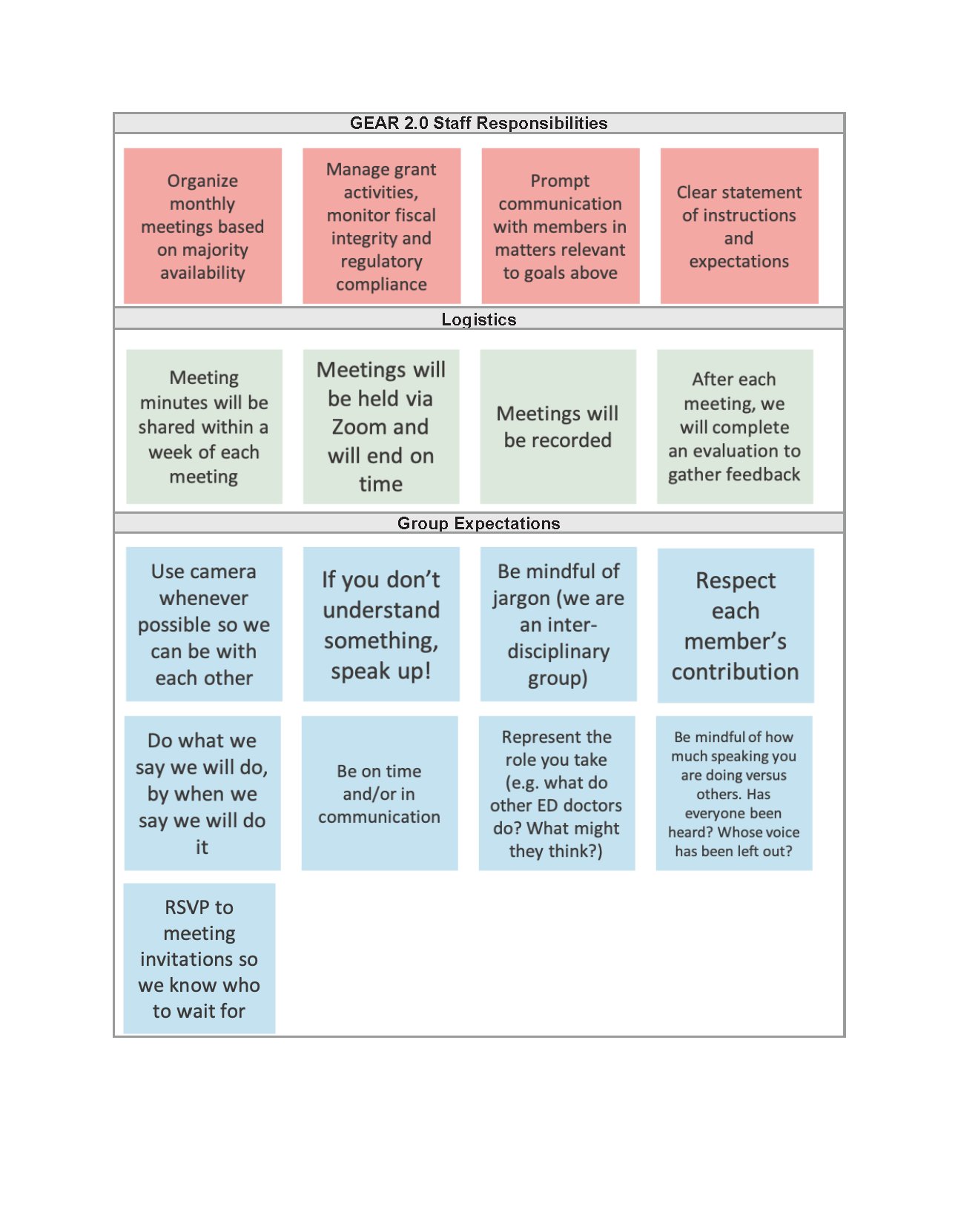Research Core Charter
This charter document delineates the GEAR 2.0 ADC Research Core Group project purpose, goals, and participant expectation
I) Purpose and Goals
GEAR 2.0 ADC Description
A fully integrated research and resource network comprised of experts in emergency medicine, geriatrics and Alzheimer’s Disease and related dementias (ADRD) that identifies research and practice gaps in the emergency care of people living with dementia (PLWD) and establishes strategies to resolve these gaps.
GEAR 2.0 ADC Goals
Phase 1 Aims (R61): Identify and propose strategies to address research gaps. Establish the GEAR 2.0 ADC infrastructure. (Yr 1-2)
- Determine research priorities for ED care of PLWD and their caregivers using a consensus process in four domains: 1. ED practices, 2. ED care transitions, 3. Detection, and 4. Communication and decision making.
- Determine the strength of available evidence by systematically conducting scoping reviews.
- Prioritize research and practice gaps in emergency care for PLWD by convening a transdisciplinary stakeholder taskforce meeting.
- Establish GEAR 2.0 – ADC governance and operations to support R33 pilot studies by partnering and leveraging transdisciplinary networks and organizations: including GEDC, ADRCs, and GEAR 2.0 Cores: 1. Administrative, 2. Research, 3. Data/Informatics, and 4. Dissemination & Implementation.
- Solicit, review, select, and fund research that will lead to future full-scale proposals addressing research gaps in emergency care for PLWD and their care partners.
- Deploy resources to support collaborative emergency care dementia research.
Project Successfully Complete When:
II) Research Core Purpose and Goals
Research Core Description
Research Core Specific Aims
- Supporting the Admin Core and its education programs to train researchers,
including webinars.
- a) Create presentations for webinars tailored to grantees needs.
- b) Create Podcasts in conjunction with the grantees.
- Providing consultations to grantees on research methods (e.g. inclusion criteria,
measures, design, randomization, strategies to prevent or reduce missing data,
analysis plan)
- a) Hold office hours at least once a month for the grantees to discuss research methods specific to their pilot projects.
- Posting materials on the GEAR 2.0 website that will include research reports, manuscripts, successful research proposals, and successful summary statements.
- Assisting grantees during the post-study transition period to identify and apply for larger scale funding.
Core Staff
Scott Dresden, MD, MS
GEAR 2.0 Co-Investigator
Northwestern University
s-dresden@northwestern.edu
Richard Marottoli, MD MPH
ADRC, Yale University
richard.marottoli@yale.edu
Heather Allore, PhD
Biostatistics, Yale University
heather.allore@yale.edu
Zachary Taylor, MPH
GEAR 2.0 Member
Northwestern University
zachary.taylor@northwestern.edu
William Hung, MD, MPH
Geriatrics, Mount Sinai
william.hung@mssm.edu
Manish Shah, MD MPH
GEAR 2.0-ADC PI Rep
University of Wisconsin – Madison
mnshah@medicine.wisc.edu
Responsibilities & Expectations

